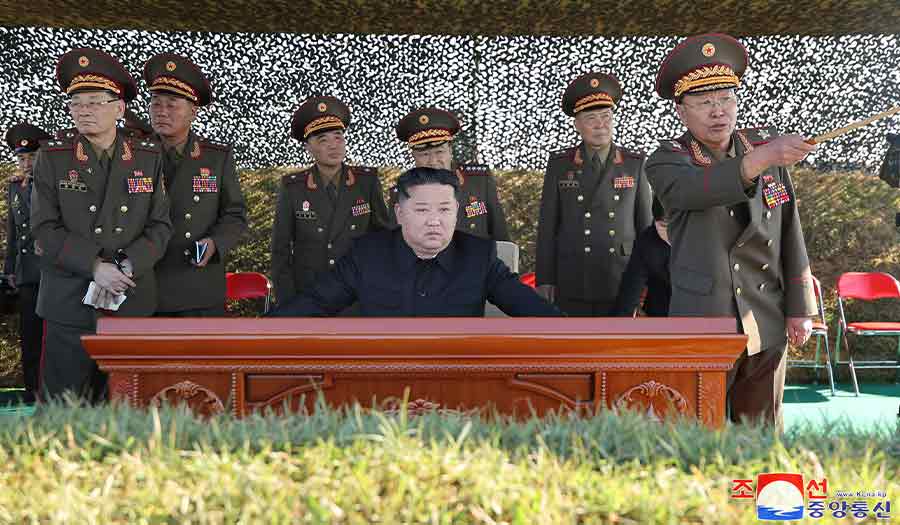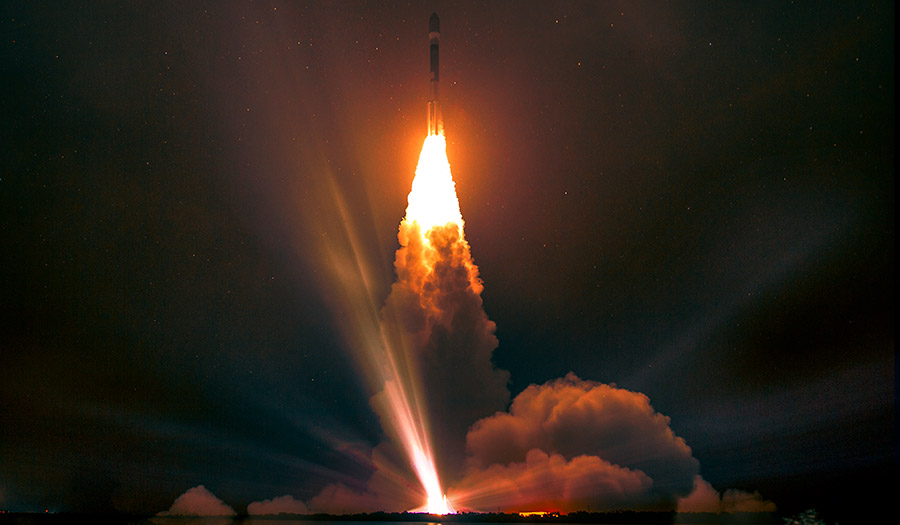 Korean Central News Agency/Korea News Service via AP
Korean Central News Agency/Korea News Service via AP
World News Desk
Learn the why behind the headlines.
Subscribe to the Real Truth for FREE news and analysis.
Subscribe NowSEOUL, South Korea (AP) – North Korean leader Kim Jong Un warned again that he could use nuclear weapons in potential conflicts with South Korea and the United States, as he accused them of provoking North Korea and raising animosities on the Korean Peninsula, state media reported Tuesday.
Mr. Kim has issued similar threats to use nuclear weapons preemptively numerous times, but his latest warning came as outside experts say North Korea could ramp up hostilities ahead of next month’s U.S. presidential election.
In a Monday speech at a university named after him, the Kim Jong Un University of National Defense, he said that North Korea “will without hesitation use all its attack capabilities against its enemies” if they attempt to use armed forces against North Korea, according to the North’s official Korean Central News Agency.
“The use of nuclear weapons is not ruled out in this case,” he said.
Mr. Kim said North Korea’s nuclear response posture must be fully enhanced because South Korea and the United States are pushing to beef up their military alliance based on joint nuclear and strategic planning, a move that he said would increase the danger of breaking the balance of power on the Korean Peninsula.
Mr. Kim apparently refers to the new South Korea-U.S. deterrence guideline that the two countries signed in July to integrate South Korean conventional capabilities with U.S. nuclear weapons to better deal with North Korea’s evolving nuclear threats. South Korea has no nuclear weapons.
Since adopting an aggressive nuclear doctrine in 2022, North Korea has repeatedly vowed to use nuclear weapons first if it perceives the leadership in Pyongyang as under threat. But many experts question if North Korea could really do so because its military is outgunned by the U.S. and South Korean forces. U.S. and South Korean officials have warned that an attempt by North Korea to use nuclear weapons would result in the end of the Kim government.
Tensions on the Korean Peninsula deepened in recent weeks, with North Korea unveiling a facility to produce weapons-grade uranium, a nuclear ingredient, and continuing a run of missile tests. In recent responses to questions from The Associated Press, South Korean President Yoon Suk Yeol said that North Korea’s disclosure of that nuclear site was likely an attempt to grab U.S. attention ahead of next month’s presidential election, and the North will likely stage major provocations like a nuclear test explosion and a long-range missile test.
Many analysts say North Korea will likely leverage its enlarged nuclear arsenal for U.S. concessions like sanctions relief after a new U.S. administration is inaugurated.
North Korea said Wednesday it will permanently block its border with South Korea and build front-line defense structures to cope with “confrontational hysteria” by South Korean and U.S. forces, while not announcing an expected constitutional revision to formally designate South Korea its principal enemy and codify new national borders.
While the moves were likely a pressure tactic, it is unclear how they will affect ties with South Korea since cross-border travel and exchanges have been halted for years.
North Korea’s military said it will “completely cut off roads and railways” linked to South Korea and “fortify the relevant areas of our side with strong defense structures,” according to the North’s official Korean Central News Agency.
South Korea’s military said later Wednesday that it will not tolerate any attempt by North Korea to change the status quo. It said South Korea will “overwhelmingly punish” North Korea if it launches provocations. A South Korean military statement said North Korea’s nuclear and missile programs have threatened peace on the Korean Peninsula.
South Korean officials earlier said North Korea had already been adding anti-tank barriers and reinforcing roads on its side of the border since April in a likely attempt to boost its front-line security posture and prevent its soldiers and citizens from defecting to South Korea. In a report to parliament on Tuesday, South Korea’s Unification Ministry said that North Korea has been removing ties on the northern side of cross-border railways and nearby lamps and planting mines along the border.
KCNA earlier Wednesday said the Supreme People’s Assembly met for two days this week to amend the legal ages of North Koreans for working and participating in elections. But it did not say whether the meeting dealt with Mr. Kim’s order in January to rewrite the constitution to remove the goal of a peaceful Korean unification, formally designate South Korea as the country’s “invariable principal enemy” and define the North’s sovereign, territorial sphere.
At the center of outside attention was whether North Korea makes new legal claims on the waters currently controlled by South Korea off their west coast. The poorly marked western sea boundary is where three bloody naval skirmishes and two deadly attacks blamed on North Korea happened in the past 25 years.
Some experts say North Korea might have delayed the constitutional revision but others speculated it amended the constitution without announcing it because of its sensitivity.
Mr. Kim’s order stunned many North Korea watchers because it was seen as breaking away with his predecessors’ long-cherished dreams of achieving a unified Korea on the North’s terms. Experts say Mr. Kim likely aims to diminish South Korea’s voice in the regional nuclear standoff and seek direct dealings with the U.S. They say Mr. Kim also likely hopes to diminish South Korean cultural influence and bolster his rule at home.
Tensions on the Korean Peninsula are at their highest point in years, with North Korea continuing a run of provocative weapons tests and South Korea and the U.S. expanding their military drills. KCNA said North Korea on Tuesday tested a long-range artillery system that observers say pose a direct threat to Seoul, the South Korean capital, which is only an hour’s drive from the border.
All exchange and cooperation programs between the two Koreas remain dormant since a broader U.S.-North Korea diplomacy on the North’s nuclear program collapsed in 2019.
Since late May, North Korea has floated thousands of trash-carrying balloons toward South Korea, reviving a Cold War-style psychological campaign. On Tuesday, South Korea’s military said North Korea was again launching such balloons across the border.
- Real Truth Magazine Articles
- INTERNATIONAL
 Nuclear War: Will Mankind Destroy Itself?
Nuclear War: Will Mankind Destroy Itself?
More on Related Topics:
- China Has Expanded Its Nuclear Force and Strengthened Ties to Russia, the Pentagon Says
- Russia and North Korea’s Partnership
- Hamas and Fatah Agree to Form a Government. What Does It Mean and Who Are These Palestinian Groups?
- President Biden’s Withdrawal Injects Uncertainty into Foreign Policy Challenges
- What to Know About the NATO Military Alliance and How It Is Helping Ukraine


